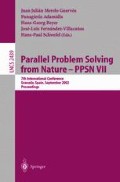Abstract
This paper discusses a promising new research direction, the automatic learning of algorithm components for problem classes. We focus on the methodology of this research direction. As an illustration, a mutation operator for a special class of subset sum problem instances is learned. The most important methodological issue is the emphasis on the generalisability of the results. Not only a methodology but also a tool is proposed. This tool is called DRM (distributed resource machine), developed as part of the DREAM project, and is capable of running distributed experiments on the Internet making a huge amount of resources available to the researcher in a robust manner. It is argued that the DRM is ideally suited for algorithm learning.
This work is funded as part of the European Commission Information Society Technologies Programme (Future and Emerging Technologies). The authors have sole responsibility for this work, it does not represent the opinion of the European Community, and the European Community is not responsible for any use that may be made of the data appearing herein.
Also in RGAI, MTA-SZTE, Szeged, Hungary
Access this chapter
Tax calculation will be finalised at checkout
Purchases are for personal use only
Preview
Unable to display preview. Download preview PDF.
References
M. J. Coster, A. Joux, B. A. LaMacchia, A. M. Odlyzko, C.-P. Schnorr, and J. Stern. An improved low-density subset sum algorithm. Computational Complexity, 2:111–128, 1992.
A. Demers, D. Greene, C. Hauser, W. Irish, J. Larson, S. Shenker, H. Sturgis, D. Swinehart, and D. Terry. Epidemic algorithms for replicated database management. In Proceedings of the 6th Annual ACM Symposium on Principles of Distributed Computing (PODC’87), pages 1–12, Vancouver, Aug. 1987. ACM.
A. E. Eiben, R. Hinterding, and Z. Michalewicz. Parameter control in evolutionary algorithms. IEEE Transactions on Evolutionary Computation, 3(2):124–141, July 1999.
Á. E. Eiben and M. Jelasity. A critical note on experimental research methodology in EC. In Proceedings of the 2002 Congress on Evolutionary Computation (CEC 2002) [8], pages 582–587.
A. E. Eiben and C. A. Schippers. Multi-parent’s niche: n-ary crossovers on NKlandscapes. In W. Ebeling, I. Rechenberg, H.-P. Schwefel, and H.-M. Voigt, editors, Parallel Problem Solving from Nature— PPSN IV, volume 1141 of Lecture Notes in Computational Science, pages 319–328. Springer-Verlag, 1996.
I. Foster and C. Kesselman, editors. The Grid: Blueprint for a New Computing Infrastructure. Morgan Kaufmann Publishers, 1999.
J. J. Grefenstette. Optimization of control parameters for genetic algorithms. IEEE Transactions on Systems, Man, and Cybernetics, 16(1):122–128, 1986.
IEEE. Proceedings of the 2002 Congress on Evolutionary Computation (CEC 2002). IEEE Press, 2002.
M. Jelasity. A wave analysis of the subset sum problem. In T. Bäck, editor, Proceedings of the Seventh International Conference on Genetic Algorithms, pages 89–96, San Francisco, California, 1997. Morgan Kaufmann.
M. Jelasity, M. Preuβ, M. van Steen, and B. Paechter. Maintaining connectivity in a scalable and robust distributed environment. In H. E. Bal, K.-P. Löhr, and A. Reinefeld, editors, Proceedings of the 2nd IEEE/ACM International Symposium on Cluster Computing and the Grid (CCGrid2002), pages 389–394, Berlin, Germany, 2002.
M. Jelasity, M. Preuβ, and B. Paechter. A scalable and robust framework for distributed applications. In Proceedings of the 2002 Congress on Evolutionary Computation (CEC 2002) [8], pages 1540–1545.
M. Jelasity. Towards automatic domain knowledge extraction for evolutionary heuristics. In M. Schoenauer, K. Deb, G. Rudolph, X. Yao, E. Lutton, J. J. Merelo, and H.-P. Schwefel, editors, Parallel Problem Solving from Nature— PPSN VI, volume 1917 of Lecture Notes in Computational Science, pages 755–764. Springer-Verlag, 2000.
B. Paechter, T. Bäck, M. Schoenauer, M. Sebag, A. E. Eiben, J. J. Merelo, and T. C. Fogarty. A distributed resoucre evolutionary algorithm machine (DREAM). In Proceedings of the 2000 Congress on Evolutionary Computation (CEC 2000), pages 951–958. IEEE, IEEE Press, 2000.
M. Pelikan, D. E. Goldberg, and F. Lobo. A survey of optimization by building and using probablistic models. Technical Report 99018, Illinois Genetic Algorithms Laboratory, 1999.
R. G. Reynolds. Cultural algorithms: Theory and applications. In D. Corne, M. Dorigo, and F. Glover, editors, New Ideas in Optimization, Advanced Topics in Computer Science, pages 367–377. McGrow-Hill, 1999.
A. S. Tanenbaum and M. van Steen. Distributed Systems: Principles and Paradigms. Prentice Hall, 2002.
Author information
Authors and Affiliations
Editor information
Editors and Affiliations
Rights and permissions
Copyright information
© 2002 Springer-Verlag Berlin Heidelberg
About this paper
Cite this paper
Jelasity, M., Preuβ, M., Eiben, A.E. (2002). Operator Learning for a Problem Class in a Distributed Peer-to-Peer Environment. In: Guervós, J.J.M., Adamidis, P., Beyer, HG., Schwefel, HP., Fernández-Villacañas, JL. (eds) Parallel Problem Solving from Nature — PPSN VII. PPSN 2002. Lecture Notes in Computer Science, vol 2439. Springer, Berlin, Heidelberg. https://doi.org/10.1007/3-540-45712-7_17
Download citation
DOI: https://doi.org/10.1007/3-540-45712-7_17
Published:
Publisher Name: Springer, Berlin, Heidelberg
Print ISBN: 978-3-540-44139-7
Online ISBN: 978-3-540-45712-1
eBook Packages: Springer Book Archive

